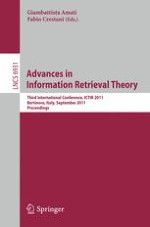This book constitutes the refereed proceedings of the Third International Conference on the Theory of Information Retrieval, ICTIR 2011, held in Bertinoro, Italy, in September 2011. The 25 revised full papers and 13 short papers presented together with the abstracts of two invited talks were carefully reviewed and selected from 65 submissions. The papers cover topics ranging from query expansion, co-occurence analysis, user and interactive modelling, system performance prediction and comparison, and probabilistic approaches for ranking and modelling IR to topics related to interdisciplinary approaches or applications. They are organized into the following topical sections: predicting query performance; latent semantic analysis and word co-occurrence analysis; query expansion and re-ranking; comparison of information retrieval systems and approximate search; probability ranking principle and alternatives; interdisciplinary approaches; user and relevance; result diversification and query disambiguation; and logical operators and descriptive approaches.
